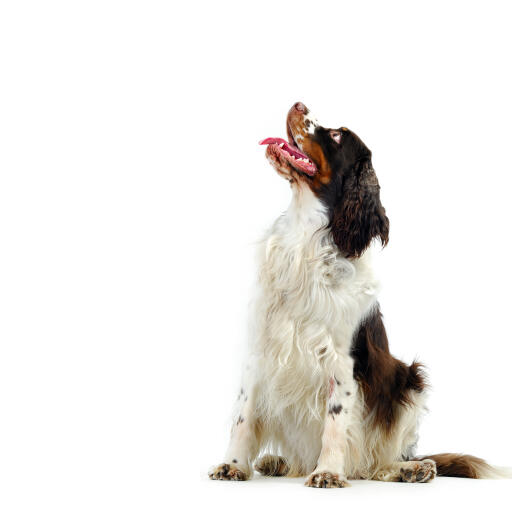Springer Spaniel (English)





Geschichte
Large land Spaniels were popular in Britain for flushing or 'springing' game for hunters. In the 1800's, the breeding of specific Springer Spaniel types began to produce a dog specifically designed for this purpose. They needed a fit dog that could range far and wide to flush out game and also retrieve. Springers were simply classed as large Cocker Spaniels until 1902, when the English Kennel Club recognised them as a separate breed. The name Springer Spaniel became official in 1900.
Verhalten
Springers are devoted, active, friendly dogs. They love exploring and thrill at rootling around undergrowth, letting their noses guide them. They are often used as Customs dogs, with an acute sense of smell and willing to please attitude; they make great working dogs. They are quick to learn, but do need training to calm down their hyperactive nature. Given plenty of exercise, Springers are perfect family pets. They are good with children and are rarely aggressive. Affectionate to the extreme, they will want to be with you all the time; Springers do not do well if left alone for long periods and can become destructive if they get bored. Springers do well in obedience, retrieving and agility and this helps expel their very active nature. They love to swim and will find the muddiest puddle possible. It is said that Springers could find water in a desert. Most suited to family life, they cope well with other pets and other dogs, subject to proper socialisation when young. They are friendly towards strangers and make appalling guard dogs. It takes a lot to wear this breed down, but when you do they love a cuddle on the sofa or a long nap in front of the fire. Springer Spaniels specifically bred for field work tend to be slightly lighter and have a thinner coat. Springers need a fair amount of grooming. A quick daily brush and clipping twice a year is enough to keep their coats looking good. With long ears, that can become matted, extra care is recommended. Purchasing a special 'Spaniel' feeding bowl can help as the ears hang outside of the food preventing them becoming matted. Health wise, the ears can become infected, mainly the ear canal, and diabetes is sometimes seen in this breed. They are greedy dogs, so obesity can be a problem if too many treats are given.
Charakter
Springer Spaniels (English) have a doting and energetic temperament. They really do need a decent amount of exercise daily or you will have a very restless and sometimes destructive dog in the home. Some individuals will be over enthusiastic and will need constant training to help them understand when calmness is necessary. That said they make great family dogs as they really are very friendly to everyone.
Gesundheitliche Probleme
Health problems* that may affect Springer Spaniels (English) include canine hip dysplasia (CHD), elbow dysplasia, luxating patella (dislocation of the knee cap), intervertebral disc disease (pressure on the spinal cord which can cause paralysis), skin diseases, rage, blood clotting disease and eye problems.
Einzelheiten zur Rasse
- Status: Common
- Lebenserwartung: 12 - 14 years
- Produktgewicht: 20 - 25 kg
- Höhe: 18-21"
- Selten: Nein
- Fell: Größe M
- Pflegeanforderungen: Mehr als einmal pro Woche
- Stadt oder Land: Beides
- Mindestanforderungen an Umgebung: Kleines Haus
- Mindestanforderungen an Garten: Großer Garten
- Rassetyp: Jagdhund
- Version: Größe M
- Energieniveau: Größe M
- Benötigte Bewegung: Mehr als zwei Stunden
Fotos der Rasse























